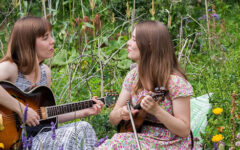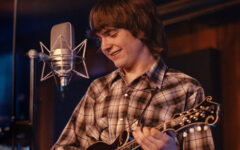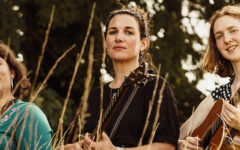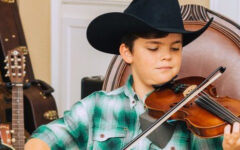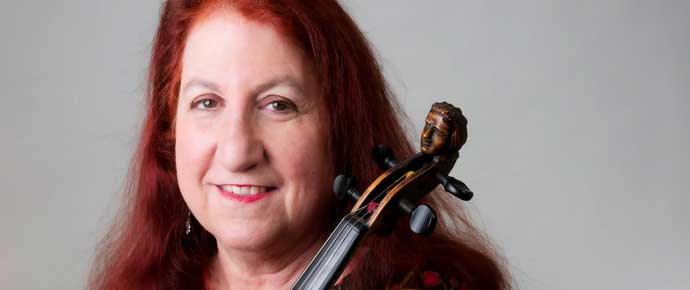
Suzy Thompson of Berkeley, CA has seemingly always been an integral part of the Bay Area acoustic music scene. She’s played with her music partner Eric Thompson and a long line of folks, such as the Todalo Shakers, Thompsonia, the Texas Sheiks, the California Cajun Orchestra, the Blue Flame Stringband, Jim Kweskin, Geoff Muldaur, Maria Muldaur, Dave Alvin, Darol Anger, Kate Brislin & Jody Stecher, Alice Gerrard, Laurie Lewis, Mary Flower, Kathy Kallick, Alan Senauke, Del Rey, and many others. In addition to being the director of the Berkeley Old Time Music Convention (BOTMC), Suzy served as artistic director from 2011 to 2016 at the Festival of American Fiddle Tunes, a week-long workshop and festival in Port Townsend, WA. There’s so much more; read it on her extended bio at ericandsuzy.com. I reached out to her to chat about the Berkeley old-time scene and the BOTMC.
Hi Suzy. What are your earliest memories of hearing this music?
I first heard old-time music at an old farmhouse near Rutland, VT, called Trailsides. It was owned by Mike Cohen, the brother of John Cohen (of the New Lost City Ramblers), who was himself a musician—he played banjo and guitar and had made at least one record with the Shanty Boys. He ran a ski camp for teens there in the winter and used it as a home base for a wilderness camp in the summer. I signed up for a ski weekend and found I hated skiing but I liked the scene and especially the music. I was already playing guitar by then, and that’s where I played music other than classical on the violin for the first time—a huge, huge deal for me—and it’s what started me off on my life’s path. There were some New Lost City Ramblers records there too, and that’s where I heard my first Cajun music, Parlez Nous A Boire.
What instruments do you play?
Fiddle and guitar, and also Cajun accordion.
What is your definition of old-time music?
For me, it’s the music of the (mostly) rural South that has its roots in the styles that pre-date World War II. I get my definition from the New Lost City Ramblers —for me, besides the fiddle and banjo music we all love, it includes ballad singing, country blues, Cajun and Creole music, various border styles like Norteño music, and jug band music, the Carter Family, and a lot of early bluegrass, which draws from the same repertoire—ballads and fiddle tunes for example.
How has the old-time music world evolved over the last 10–20 years? Are there any new musical trends, lineups, or instrumentation that you like?
Old-time music has become way, way more popular than I ever thought to see. So many younger people are into the music than ever before and they bring their own energy and sensibilities into it, which is great. Music SHOULD evolve and change. It’s death when it becomes a museum piece. I love that there are still some musicians religiously trying to re-create the old recordings of the 1920s and also some for whom “old-time music” means the Ithaca sounds of the 1970s. I love it that people are still playing the good old songs and tunes and also writing new ones that fit into the genre. Some of these newer tunes do work their way into the tradition.
What shows do you have coming up?
Thompsonia (me, Eric, and daughter Allegra) will be doing a program of Cajun music at the Berkeley Horticultural Nursery on Friday, October 14, from noon to 3:00, and it’s FREE! At BOTMC, on Wednesday, September 21, I’ll be playing with Ann Savoy at Ashkenaz—the first time we’ve had a Cajun dance as part of the BOTMC. We’ll play first, and the second half will be square dancing to Corn Potato String Band, with Mike Lewinski calling. I’m also part of the Skillet Licorice Allsorts Orchestra at the Freight on Friday night. I love seconding on those East Texas Serenaders rags and waltzes! I’ll also do tweeners at both of the Freight concerts. One will be a duet with Ann Savoy and the other a duet with Valerie Turner of Piedmont Blūz.
What’s the history of BOTMC?
It started in 2003 when the Ecology Center/Berkeley Farmers Market asked me to put on a one-day bluegrass festival, and their budget was $300. I knew I couldn’t put on a bluegrass festival for that, but I thought it would be fun to have a string band contest, with prizes being wooden nickels that you could spend at the farmers market. It was hugely successful. We had about 20 bands, some of them really great, including the winning band, the Squirrelly Stringband. So the next year, we (that being me and various friends including the members of the aforementioned Squirrelly Stringband) decided to add a concert at the Freight the night before. At the time, the Freight was on lower Addison, near San Pablo. And that was hugely successful too. In fact, it was so successful that I was able to pay our two headliners, Mike Seeger and Kenny Hall, twice what I’d promised them! That felt really, really good. Then it just grew from there.
The schedule has a bit of everything, workshops, concerts, and jams. What else?
The string band contest, which has always been the centerpiece of the BOTMC, takes place in Civic Center Park—the same location as the infamous Berkeley Fiddle & Banjo Contests of the 1960s. (It was called Provo Park then.) This year we’re doing two lecture/demo-type workshops, both of which are free: A Visit with Alice Gerrard and Earl White’s “Black Americans in Old Time Music: Then and Now.
What are some other highlights this year?
Both of the Freight shows are going to be spectacular. I can’t wait to see Corn Potato String Band in person on Thursday at the Freight. I love their recordings and their YouTube videos. They’re so energetic and have such great oddball taste in material and are so, well, corny! The eyes and ears of America! I’m also excited to hear Piedmont Blūz. I got to hear them a few years ago at a festival and loved their whole approach, which is kind of scholarly/geeky but also very heartfelt. I’m also excited for the Wednesday night dance when our family band, Thompsonia, gets to back up Ann Savoy. I played some gigs with her last month and we had a blast. She’s heavily into the weird old Cajun music, which is my favorite repertoire.
How many volunteers does it take to put this on?
About 50. Volunteers get free admission to one of the Freight shows, and we’re still looking for volunteers! Go to the web site for more information.
The posters are always great. Is there much thought put into them or does the artist just run with it?
Until last year, Dave Murray did all our posters, and he’s kind of a genius with graphic arts. Each year he’d come up with another super-cool concept. He stepped down from doing that last year, so now we have a different artist every year. A LOT of thought goes into it now, and we work really closely with the artist. This year Howard Rains (of Spencer and Rains) came up with a wonderful concept.
How many venues does it cover?
This year, it’s the Freight, Ashkenaz, Civic Center Park, Berkeley Horticultural Nursery (a new venue for us), and the secret location of the afternoon jams (you can find out the secret location via email. See the BOTMC website for more information.)
Can people watch online?
Both Freight shows will be live-streamed; you have to buy a ticket BEFORE the show to view it. Those shows will stay up for a few days at least but not indefinitely. Ticket information is on the BOTMC website. The two free workshops on Sunday, A Visit with Alice Gerrard and Earl White’s Black Americans in Old Time Music: Then & Now, will both go up on YouTube, but won’t be available until at least a week after the BOTMC. To get the URL, join the BOTMC email list.
What other events is the BOTMC organization involved in?
We’ve been working with the Oakland Public Conservatory of Music, a black community music school, on a brand new project called Black Banjo & Fiddle Fellowship. It’s a teacher-training educational two-year program that will launch next spring. Four “fellows” (not a gender-specific term) will study (via Zoom mostly) with Jake Blount, Earl White, and Tony Thomas, plus some guest instructors, and an old-time music program will be created at the Oakland Public Conservatory. I’m pretty sure that it will be the only such program at a black music school. We also often put on a one-day free festival called the Spring Situation. And we hope to present another anti-racist online interactive workshop later this fall or in the winter.
How has this event evolved over the years?
It’s grown from a string band contest to five days of concerts, workshops, dances, stuff for kids, hosted jams, plus the string band contest. Our budget has grown a lot. We’re fortunate to get funding from a variety of sources, and that makes it possible for us to present such a fantastic lineup of musicians. The sad thing is how many of the older generation musicians that we were so very lucky to host in our earlier years are gone now—Benton Flippen, the New Lost City Ramblers, and Franklin George are all gone now.
What is the best part about putting this on?
The best part is the incredible group of people who help put on the BOTMC. Most of the members of the organizing group have been involved since the beginning, which is so incredible given that this is our 19th year. These are people who do what they say they’re gonna do. I’ve never worked with a group that was this steadfast and had so much follow-through. We’ve also been blessed with amazing volunteer coordinators. Lael Sigal is the current volunteer coordinator.
Comedy of some sort is part of the old-time tradition. Is it represented in some fashion other than cool band names and irreverent band humor?
You’re totally right—some of the bands have done some old-time comedy. I remember some great jokes told by Daniel Rothwell when he was here with his grandfather, the flatfoot dancer Thomas Maupin. The Corn Potato String Band has some hilarious old-time material—songs like Was I Drunk, Flying Saucers, and I Had But Fifty Cents. Maybe someday we’ll have a group that can recreate some of those skits from the old 78s, although an awful lot of that material would not fly very well in this day and age. Something like Hog Killing Day In Georgia (sorry, vegans) or Exhibition at Possum Trot Schoolhouse would be really cool.
What’s the wackiest thing you’ve ever witnessed at the convention?
A band in the string band contest dragged a full-sized pump organ onto the stage and proceeded to completely tear up some old-time fiddle tunes in a wild punk-influenced style. I think also that they were not wearing any shirts. They won of course.
Thank you Suzy for all of your great contributions to old-time music.
Thank you for asking all these good questions, and I hope you’ll be able to make it to some of the BOTMC this year!
Copy editing by Jeanie Poling

